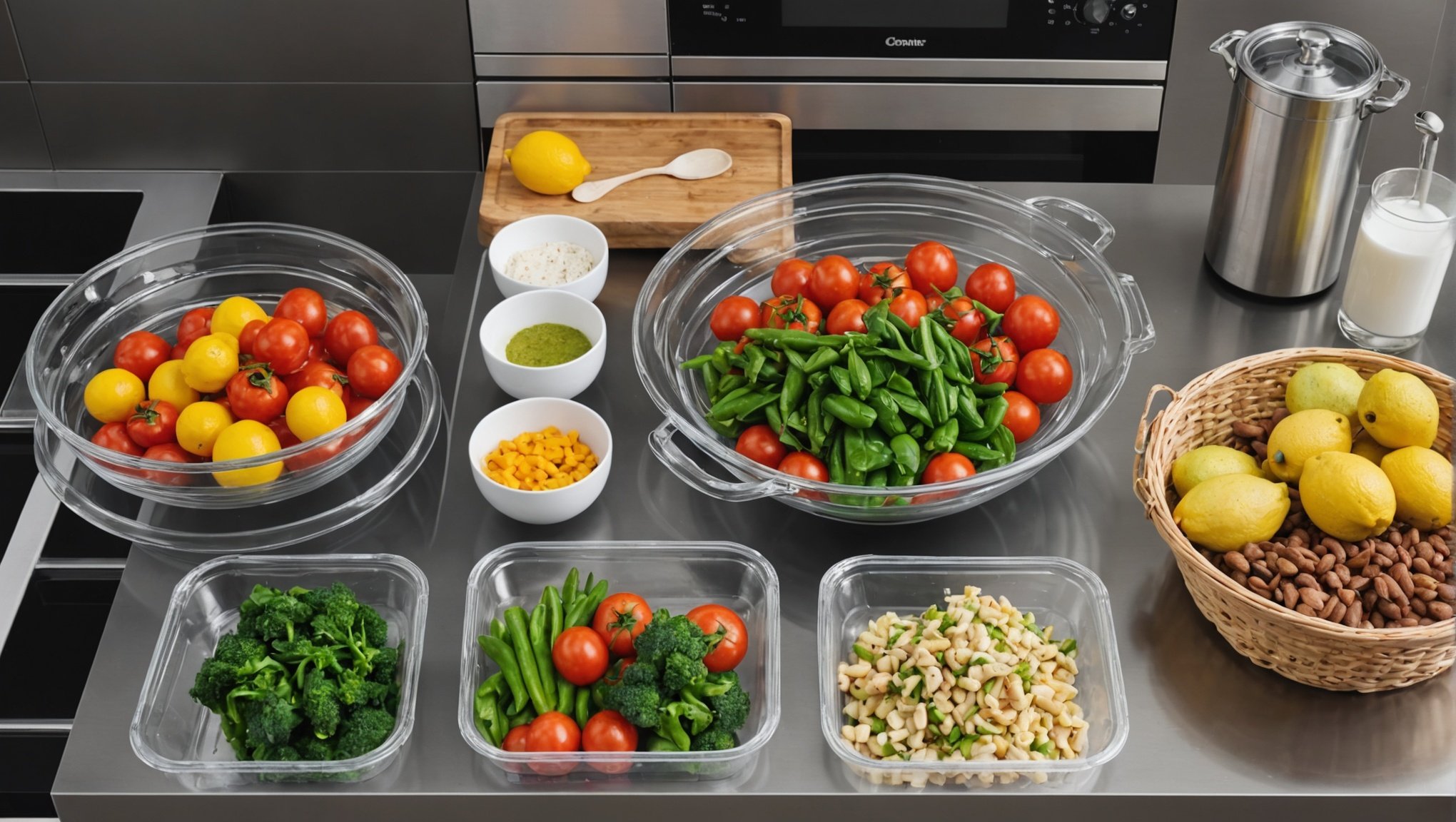Transform Your Kitchen: Innovative Organization Solutions to Reduce Food Waste
Understanding the Problem of Food Waste in Your Kitchen
Food waste is a pervasive issue that affects not only the environment but also your wallet and the efficiency of your kitchen. According to ReFED, a U.S.-based nonprofit, food waste is a systemwide problem that requires comprehensive solutions.
When you think about it, the kitchen is the heart of your home, and it’s where a significant amount of food waste occurs. From expired ingredients to unused leftovers, the potential for waste is vast. Here are some key reasons why food waste happens in your kitchen:
Also read : Creating a Vibrant Color Palette to Boost Focus and Energy in Your Home Gym
- Expired Ingredients: Many of us have been guilty of buying more than we can use, only to see those items expire before they can be consumed.
- Poor Storage: Inadequate storage solutions can lead to spoilage and waste. For example, if your fruits and vegetables are not stored properly, they can go bad much faster.
- Lack of Meal Planning: Without a clear plan for meals, you might end up buying too much food that eventually goes to waste.
- Inefficient Kitchen Organization: A cluttered and disorganized kitchen can make it difficult to keep track of what you have, leading to overlooked and expired items.
Effective Storage Solutions to Reduce Food Waste
One of the most critical steps in reducing food waste is implementing effective storage solutions. Here are some innovative and practical storage ideas to help you make the most of your kitchen space and ingredients:
Use Airtight Containers
Airtight containers are a game-changer for keeping your food fresh. Here’s why:
Topic to read : Creating a Vibrant Color Palette to Boost Focus and Energy in Your Home Gym
- Save Space: Stackable nesting containers can save you real estate in your kitchen cabinets, making room for other essentials.
- Reduce Waste: Airtight seals keep your food fresher for longer, reducing the likelihood of spoilage and waste.
- Stay Green: Opt for eco-friendly materials like bioplastic or upcycled plastic to contribute to a circular economy.
| Type of Container | Benefits |
|
|--------------------------------------------------------------------------|
| Airtight Stackable | Saves space, reduces waste, keeps food fresh |
| Bioplastic Containers | Eco-friendly, sustainable, and durable |
| Glass Containers | Non-toxic, easy to clean, and visually appealing |
Label and Organize Your Containers
Labeling your containers can make a significant difference in your kitchen organization. Here are some tips:
- Label Everything: Use a chalk marker or a label maker to mark your containers so you can easily locate what you need.
- Set Zones: Sort out zones for snacks, baking ingredients, meal prep items, etc. This helps in finding what you need quickly.
- Rotate Food Items: Keep newer food at the back and older food at the front to ensure nothing goes bad before its time.
Utilize Vertical Space
Maximizing your kitchen’s vertical space can help in storing more items efficiently. Here are a few ideas:
- Over-the-Door Organizers: Use over-the-door organizers to store spices, cans, plastic wrap, and other items, keeping them accessible but out of sight.
- Adjustable Pot Lid Organizers: Keep your pot lids organized with adjustable organizers that can be stored in a drawer or cupboard.
Innovative Kitchen Gadgets to Streamline Your Cooking
In addition to storage solutions, certain kitchen gadgets can significantly streamline your cooking process and help reduce waste. Here are some must-have gadgets:
Microwave Cleaner
The Angry Mama Microwave Cleaner is a simple yet effective tool for cleaning your microwave without harsh chemicals. It loosens stubborn food splatters and grease, making it easy to wipe away the mess with minimal effort.
Cordless Food Chopper
The KitchenAid Go™ Cordless Food Chopper is a versatile tool that can chop nuts, vegetables, and other ingredients quickly. It comes with interchangeable batteries and multiple bowls, making it ideal for prep work and storing ingredients in the fridge.
Clip-On Strainer
The AUOON Clip On Strainer is a space-saving and mess-reducing tool that clips onto the side of your pots and pans, allowing you to drain water or grease without using a separate colander.
Incorporating Frozen Produce for Sustainability
Using frozen produce is another innovative way to reduce food waste and maintain kitchen efficiency. Here’s how it can benefit your kitchen:
Consistent Quality and Year-Round Availability
Frozen tropical fruits and vegetables ensure consistent quality and flavor throughout the year, independent of seasonal variations. This stability helps in better menu pricing and budget management.
Reducing Food Waste
Frozen produce can be used as needed, reducing the amount of unused perishables and significantly reducing waste. This not only helps manage costs better but also supports sustainability efforts.
Boosting Kitchen Efficiency
Pre-prepared frozen fruits and vegetables reduce preparation time significantly. Chefs can focus more on creativity and service rather than spending time on essential preparation, speeding up service and reducing labor costs.
Practical Tips to Make Your Kitchen More Sustainable
Here are some practical tips to help you reduce food waste and make your kitchen more sustainable:
Map Out Your Meals
Planning your meals in advance can help you avoid buying too much food that might go to waste. Take some time each week to plan your meals and make a grocery list accordingly.
Get Savvy on Storage
Proper storage is key to extending the shelf life of your ingredients. Use airtight containers, keep your fridge organized, and ensure that older items are used before they expire.
Give Leftovers New Life
Don’t let leftovers go to waste. Get creative with them by turning last night’s dinner into tomorrow’s lunch or using leftover vegetables in a soup or stew.
Take Expiration Dates with a Grain of Salt
Expiration dates are not always a hard and fast rule. Check the freshness of your ingredients before discarding them, and use your best judgment to decide if they are still usable.
Community and Business Initiatives for Waste Reduction
Reducing food waste is not just a personal responsibility but also a community and business effort. Here’s how different stakeholders can contribute:
Business Services and Support
Companies like MIC Food work closely with chefs and restaurateurs to develop innovative recipes and menu items that highlight sustainable ingredients. They also offer staff training, marketing initiatives, and flexible packaging options to support waste reduction efforts.
Nonprofit Initiatives
Organizations like ReFED provide comprehensive data and insights on food waste, catalyze capital and innovation, and mobilize businesses to adopt sustainable practices. They also connect stakeholders across the food system to drive coordinated action.: Making Your Kitchen a Zero-Waste Zone
Transforming your kitchen into a zero-waste zone is a journey that requires commitment, the right tools, and a bit of creativity. Here are some final thoughts and actionable advice:
- Invest in Quality Storage: Use airtight containers, over-the-door organizers, and other storage solutions to keep your ingredients fresh and organized.
- Utilize Innovative Gadgets: Tools like microwave cleaners, cordless food choppers, and clip-on strainers can streamline your cooking process and reduce waste.
- Incorporate Frozen Produce: Frozen fruits and vegetables can provide consistent quality, reduce waste, and boost kitchen efficiency.
- Plan Your Meals: Take the time to plan your meals and make a grocery list to avoid buying too much food that might go to waste.
- Get Creative with Leftovers: Turn leftovers into new meals to reduce waste and save money.
By implementing these solutions, you can make your kitchen more efficient, sustainable, and waste-free. As Chef Steven Satterfield notes, “Reducing food waste is not just about saving money or resources; it’s about creating a more sustainable food system for everyone”.
So, start your journey today and make your kitchen a place where every ingredient is valued and every meal is a celebration of sustainability.










